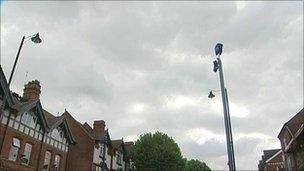'Spy' camera police 'treated people like idiots'
- Published

The cameras that remain in place have been covered
West Midlands Police "treated people like idiots" over the way more than 200 surveillance cameras were installed in parts of Birmingham with large Muslim populations, an MP has said.
The cameras - covert and overt - were put up earlier this year and were paid for with £3m of government money put aside for tackling terrorism.
But the communities were in uproar after they were not consulted, prompting the force to apologise and instigate an independent review by Thames Valley Police into what happened.
The findings were highly critical, saying the force paid little attention to "compliance with the legal or regulatory framework" and relations between the Muslim community and police had been set back 10 years.
'Deceit and arrogance'
West Midlands Police Authority was criticised for its lack of "scrutiny and oversight" on the project.
In response the authority said at a public meeting on Monday it is now considering five options over the future of the cameras:
One would see the scheme withdrawn and the cameras left covered, while another would see the withdrawal of the scheme with the cameras taken down.
A third option would see the cameras taken down and a smaller scheme implemented using 35 ANPR and 22 CCTV cameras.
A fourth option would be to deploy the cameras across the city to monitor anti-social behaviour following consultation. The final option would see a smaller scheme run where the cameras currently are and use others across the city.
The Chief Constable of West Midlands Police, Chris Sims, said at the meeting he was in favour of removing all the cameras.
The authority will now look at the costs involved in their removal.
Roger Godsiff, Labour MP for Birmingham Sparkbrook and Small Heath, said the police overall had displayed "incompetence" over the way they behaved, believing they could "get away with" installing the cameras without needing to talk to residents.
"It's a combination of incompetence, deceit and also arrogance," Mr Godsiff said.
"It defies comprehension that they could have got away with it and it's really treating people like idiots.
"They made a conscious decision of 'we won't lie, we will put into the public domain what we want to and we will wait and see if people ask questions'."
The scheme, called Project Champion, was conceived around 2007 with the CCTV and automatic number plate recognition (ANPR) cameras being installed earlier this year.
The project was led by Birmingham Safer Partnerships, made up of the city council, police and other agencies.
The subsequent independent report into it said its aim was to "create a vehicle movement 'net' around two distinct geographical areas within the city, namely Alum Rock and Sparkhill".
"The system was needed in order to carry out surveillance operations against identified suspects without having to follow them into and out of residential areas and therefore risk being compromised," it added.
But civil rights groups have questioned the legality of the approach the police and others took.
'Divisive project'
Corinna Ferguson, legal officer at Liberty, said: "It now appears that the police did not comply with Regulation of Investigatory Powers Act (RIPA) or the Data Protection Act (DPA), and therefore the planned surveillance was in breach of the right to privacy under the Human Rights Act.
"The police also acted unlawfully in failing to have any regard for the equality implications of the scheme. This divisive and counter-productive project must now end. The cameras must come down."
Liberty has now threatened legal action against the force if it refuses to agree to remove all the cameras in the next two weeks.
Thames Valley Police, which carried out the independent review, said it could not confirm whether the force acted illegally as the "terms of reference" of their review did not ask to examine if the system was lawful.
A Thames Valley spokesman said: "There are guidelines regarding the positioning of cameras that were not followed.
"The system was never operational and as such it would be speculation on what the position might have been if and when it went live."
Mr Godsiff said: "I cannot believe when originally the £3m was earmarked from the TAM fund that the officers involved thought they could get away with it without any questions raised.
"At a meeting with the police, some councillors seemed all right with it, some were suspicious but they didn't say 'how lucky are we in Sparkbrook for £3m to be found and given to us and no where else in the country', when, quite frankly it's really 'where's this from and what's behind it?'.
"So when police say they didn't lie, they're right, they didn't, they just didn't say and weren't properly asked.
"The tragedy is, if they had been up front and asked people then I think a good proportion would say yes."
Mr Godsiff added: "The police must now hold their hands up and say they've made a mistake and take responsibility and do a proper consultation and write to everyone where the cameras are."
- Published25 October 2010
- Published19 October 2010
- Published30 September 2010
- Published6 August 2010
- Published30 July 2010
- Published17 June 2010